
Guests
- Tavis SmileyTV and radio broadcaster. He hosts the TV show Tavis Smiley on PBS and two radio shows, The Tavis Smiley Show and Smiley & West, which he hosts with Cornel West. Together they have written the new book, The Rich and the Rest of Us: A Poverty Manifesto.
- Cornel Westprofessor of religion and African-American studies at Princeton University. He is author of numerous books and co-host of the radio show Smiley & West with Tavis Smiley. Together they have written the new book,The Rich and the Rest of Us: A Poverty Manifesto.
In part two of our interview, Tavis Smiley and Dr. Cornel West discuss growing up in working-class households. “I saw so much poverty growing up,” says Smiley, who lived with 13 family members in a three-bedroom trailer and learned that even when he was not optimistic, he could be hopeful. “Hope needs help,” Smiley notes. West recalls how he worked with the Black Panthers to organize a general strike while growing up in Sacramento, California, in order to push for African-American studies programs in local high schools. Looking at current events, Smiley and West cite Dr. Martin Luther King Jr.'s comment that “war is the enemy of the poor” and compare the amount of money spent in Iraq and the 2012 presidential campaign to funding for programs that assist the one in two Americans who are now poor. They also discuss the Trayvon Martin case and react to Ted Nugent's potentially threatening comments about President Obama at the recent National Rifle Association meeting.
Click here to see Part 1 of this interview.
AMY GOODMAN: This is Democracy Now!, democracynow.org, The War and Peace Report. I’m Amy Goodman, with Juan Gonzalez, as we continue with our conversation with PBS broadcaster, NPR broadcaster, Tavis Smiley, and Princeton University professor and preacher, Cornel West. They have written their first book together, though they have written many books separately, The Rich and the Rest of Us: A Poverty Manifesto. You know, this is your first book together, and I was wondering if you could each talk about your own lives, because you talk about each other’s lives in the beginning of the book. But Tavis, talk about where you grew up and the circumstances, your family.
TAVIS SMILEY: Let me just say, given that I regard Dr. West as the leading public intellectual in our nation, that I regard him as a Du Bois of our time. For all the good work we’ve done together for 25 years, nothing has delighted me more than to have my name on the cover of a book next to his name, because I so love and respect and revere Cornel West and his contributions to this great nation and the world, for that matter. So, to get a chance to sit and write a book with him, where we bring our shared experiences and individual experiences to bear on a topic like poverty, was just an opportunity I couldn’t pass up.
And our upbringings are very different. We are brothers connected at the heart. We grew up in very different environments. He can speak about his own. But I grew up as one of 10 kids. I’m the eldest of 10 kids, grew up in a three-bedroom trailer, my seven brothers and me in one bedroom, my two sisters and my maternal grandmother, Big Mama, in the second bedroom, and my mother and father, Joyce and Emory Smiley, in the third bedroom—13 people in a three-bedroom, one-bathroom trailer. That’s how I was raised, in a trailer park with all white people. We were the only black family for miles around in this white trailer park. The good—
AMY GOODMAN: Where?
TAVIS SMILEY: In Indiana, North Central Indiana. The good news about that is I learned at an early age that we can get along, if I could take Rodney King’s question and answer it: yes, we can get along. America is a nation where black and white and red and brown and yellow can come together for the sake of making America a greater democracy. So I’ve always believed in the best of America. In that sense, I resonate with Martin’s dream, rooted in the American Dream. I resonate with Dr. King in that regard.
On the other hand, though, I saw so much poverty growing up, because I lived that story growing up. And I’ve been fortunate, and I’ve been blessed. And the short answer is, I know that, even when we can’t be optimistic—and Doc makes this point all the time—even when we can’t be optimistic, we can always be hopeful. And I’m a witness, I’m an example, that you can build an entire life on hope. As I’ve gotten older, though, I realize, though, that hope needs help. And those of us who have the platform and have the opportunity to speak for those who don’t have a voice, Doc and I believe and argue in the book, that is, the telling of truth that allows suffering to speak, so that the suffering is never heard, much less addressed, if those of us who have platforms, like Democracy Now!, don’t raise our voices to speak out on their behalf. That’s why I celebrate what you do and celebrate the opportunity to do this book with Dr. West.
JUAN GONZALEZ: And, Cornel West, the amazing thing about this is that poverty is no stranger to either of you. Talk about your upbringing.
CORNEL WEST: Well, I didn’t grow up in the same kind of poverty this brother did, though. He was broke as the Ten Commandments financially. We had some flow of resources, you know what I mean? It was more working class, lower middle class. But most importantly, we were spiritually rich. We were morally rich. Irene and Clifton, my parents, my brother Cliff, my sisters Cynthia and Cheryl. I’m the father of Zeytun and Cliff and grandfather of Kalen. I’ve lived an extremely blessed life, even though I come out of that—both stable working class, lower middle class. When I met this brother, we decided—what, 25 years ago?
AMY GOODMAN: You grew up in Sacramento.
CORNEL WEST: Sacramento, California, yeah. It was 25 years ago, I say, “We are going to live and die to keep alive the legacy of Martin King and Fannie Lou and [inaudible]—
AMY GOODMAN: You were fighting from when you were in school. You were what? President of your class, but fighting to include African-American studies?
CORNEL WEST: Yeah, we had a general strike, absolutely.
AMY GOODMAN: What year was it?
CORNEL WEST: That was 1969. We shut the whole—
AMY GOODMAN: And why did you strike?
CORNEL WEST: —city down to make sure they had black studies in every high school, who wanted it. We weren’t authoritarian or coercive about it, you know. But already, you know, we had been set on fire by not just Martin King, but I was working closely with the Black Panther Party, as a Christian, of course. We had wonderful tensions, but I was working the breakfast program, working with them every day trying to ensure they had black studies. And so, when Tavis and I come together, he’s from Kokomo, Indiana—Sacramento, California—boom! King legacy 2012, in our own feeble way. I mean, you know, we’re just doing what we could do before we die.
JUAN GONZALEZ: And we’ve been covering extensively on Democracy Now!, when you talk about fighting for black studies in the schools, the battle in Arizona in Tucson over the state legislature passing a law—
CORNEL WEST: Oh, yeah, absolutely.
JUAN GONZALEZ: —that essentially bans Latino studies in the city of Tucson in the public schools there.
CORNEL WEST: Absolutely.
AMY GOODMAN: And the books that are the heart of the curriculum.
CORNEL WEST: Absolutely.
JUAN GONZALEZ: Yeah, and they banned the books that are the curriculum.
CORNEL WEST: As you point out in your magisterial text, old brother, in some ways, that’s a compliment, because when the powers that be want to suppress the truth, we know truth crushed to earth shall rise again. The truth is dangerous.
JUAN GONZALEZ: Right.
CORNEL WEST: The truth is—pushes people against the wall.
AMY GOODMAN: You both, in your book, The Rich and the Rest of Us: A Poverty Manifesto, refer to Dr. King. I wanted to play a clip of Dr. King. You talk about his campaign against poverty. This was the speech he gave not far from here, Riverside Church, April 4th, 1967, a year to the day before he was assassinated.
REV. DR. MARTIN LUTHER KING JR.: Tonight, however, I wish not to speak with Hanoi and the National Liberation Front, but rather to my fellow Americans. That is at the outset a very obvious and almost facile connection between the war in Vietnam and the struggle I and others have been waging in America. A few years ago there was a shining moment in that struggle. It seemed as if there was a real promise of hope for the poor, both black and white, through the poverty program. There were experiments, hopes, new beginnings. Then came the buildup in Vietnam, and I watched this program broken and eviscerated, as if it were some idle political plaything of a society gone mad on war, and I knew that America would never invest the necessary funds or energies in rehabilitation of its poor so long as adventures like Vietnam continued to draw men and skills and money like some demonic destructive suction tube.
AMY GOODMAN: That was Dr. King, April 4th, 1967. Tavis Smiley, it’s not the speech we usually hear when referring to Dr. King.
TAVIS SMILEY: It is the most courageous speech that Martin King ever gave in his life. And for giving that speech, he was demonized. We talk about this in our work. King, in the last poll taken in his life about his acceptance in popularity in the country, 55 percent of black had turned against black people because of his opposition to the Vietnam War. Seventy-two percent of Americans across the board had turned against Dr. King because of his opposition to the war.
JUAN GONZALEZ: New York Times and the Washington Post editorialized against him.
CORNEL WEST: Oh, man.
TAVIS SMILEY: They killed him.
CORNEL WEST: Basically him a communist, basically called him a communist.
TAVIS SMILEY: They absolutely did. They did. That speech is, again, the most courageous speech he ever gave. And there’s one line in that speech—many lines, but one that always resonates with Dr. West and myself, and we talk about it in this book, we quote him in this text: “War is the enemy of the poor.” That’s Martin King. “War is the enemy of the poor.” And the two of you, given the fine work you do here on this Peace Report every day, you understand that. All the resources, the trillion-plus dollars we’ve spent in these military excursions—you can’t even call them “excursions” now, because we’re now—this is the longest war in the history of this country; it’s not an excursion anymore.
CORNEL WEST: Invasion, occupation.
TAVIS SMILEY: Exactly, without, obviously, an exit strategy. But think of all the money spent there that could have been spent on programs here for the poor, number one. Number two, now that we’re no longer in Iraq, as we once were, at least, how will that money be spent domestically that was being spent in Iraq? And since I’m talking about money, and we’re talking about this campaign for the White House, if Mitt Romney is going to raise, as the papers suggest, about $600 million this time around, Barack Obama last time raised $750 million and will raise more now that he’s an incumbent—I’m no math major—you put those two together, you’re talking a billion-plus dollars. Think of how much money—what that money could be used for vis-à-vis programs in this country. But there’s so much money in our politics, both parties beholden to big business and to corporate America, and that’s not even mentioning all the money now being activated by these super PACs. But just think about all that money to run a campaign for the White House and what that money could be used for. It’s sickening to me, quite frankly.
JUAN GONZALEZ: Well, the amazing thing to me also is, in the midst of this crisis, all of these governments, both the federal government and the state governments, talking about cutting back expenditures, all aiming at the pension funds, the pension funds of city workers, of teachers, of other folks, a way to actually accelerate the move toward poverty, not to pull it back.
CORNEL WEST: That’s right, because then we’ve got to think we know that the austerity cuts just reinforce recession, reinforce depression, make it more difficult to generate demand on the part of working people, having resources to spend even. So this is even within the capitalist framework, it reinforces the race to the bottom, without any serious consideration of not just taxes on the wealthy, but attempts to restructure the economy in such a way that something called “public interest” has real small substance.
AMY GOODMAN: And then, what about the crackdown on dissent in this country?
CORNEL WEST: Oh, yes.
AMY GOODMAN: I mean, we see the report just came out of UC Davis, the—very critical of the administration for the in-the-face pepper-spraying of these students who were protesting tuition hikes.
CORNEL WEST: Absolutely.
AMY GOODMAN: You see the encampments of Occupy wiped out around the country. You see police forces in this country—you talk about the war abroad and the billions that go into that—police forces in this country that are getting millions of dollars. They’ve got drones. They’ve got tanks. And then you—
JUAN GONZALEZ: The surveillance of the Muslim community, right? By the New York Police Department.
CORNEL WEST: Oh, absolutely, absolutely.
AMY GOODMAN: That’s right, the Associated Press just winning the Pulitzer Prize for exposing the monitoring of the Muslim community.
CORNEL WEST: Absolutely. You know, I’m very blessed to stand with Brother Christopher Hedges and Noam Chomsky and Daniel Ellsberg and others against the U.S. government in terms of this National Defense Authorization Act. We were just in court here, 500 Pearl Street, a few weeks ago, and we’ll come back. Meaning what? Section 1021, 1022: U.S. government has the right to detain persons without trial, without due process, without judicial process, if you are in some way associated with associate forces of terrorist groups or have some connection with terrorist groups. Which means, in the '80s, I'm going straight to jail, because nobody is going to stop me from being in contact with Nelson Mandela, and he’s on the terrorist list for 20-some years. That’s sponsored by the U.S. government. So that is part of the criminalizing of dissent. And we always know, in the middle of these kinds of cultural and political and outright military wars, truth is always the first casualty.
AMY GOODMAN: We have been covering a case that happened on November 19th. This whole country knows about Trayvon Martin, not because in Florida they decided to prosecute the shooter, George Zimmerman, but because, first, people rose up all over the country.
TAVIS SMILEY: That’s right.
CORNEL WEST: That’s right.
AMY GOODMAN: And although the special prosecutor, when she said, you know, “This is not because of outcry; this is because we’ve looked at the facts” — that’s clearly the case, they looked at the facts, but what got it into the hands and the purview of a special prosecutor, what it takes in this country—Juan and I have been looking at this case of a man named Kenneth Chamberlain in White Plains, New York, not far from here, lived in a public housing project, 68 years old. He was a corrections guard, before that a Marine. He was also a heart patient, and he wore a medical alert pendant. He rolled over on it, apparently, or something triggered it at 5:00 in the morning on November 19th. It alerted the life alert company. They couldn’t reach him on the little box in the dining room that, you know, speaks to the person who’s in the room, so they called police, said, “Not a criminal issue. It’s a medical emergency. Get over there.” They got over there. They started slamming on the door, and then they really started slamming. Yes, Chamberlain got up. He said, “I’m OK. I’m OK.” Life alert company called the police, said, “Hey, cancel the call. He’s OK. We are talking to him.” He’s telling the police, “I’m OK. I’m OK.” He’s saying ”Semper fi, Semper fi, I’m OK.” They take the door off its hinges. They take a taser gun, and you see the video of the taser gun that the DA now has, and it shows him in his boxer shorts, according to his lawyers and his son. And they tase him. But that was not enough. They then shot him dead, this heart patient. Within an hour, this happened. And this is a case that’s now before a grand jury in White Plains. It hasn’t got as much—
JUAN GONZALEZ: It happened in November.
AMY GOODMAN: Right, and it finally got to the grand jury many months later. It’s not clear what will happen. Juan, reporting for the New York Daily News, found the name of the police officer who shot him dead, Anthony Carelli.
JUAN GONZALEZ: Who also happened to have already a federal case against him for beating up two Muslim brothers in another arrest case, and he’s about to go to trial on that case.
CORNEL WEST: Wow.
JUAN GONZALEZ: And meanwhile, he’s the one who shot—
AMY GOODMAN: And this was very embarrassing to the police, when Juan found the name of the police officer, because it just so happens, on April 23rd, they have sued him. He was calling them “rag head.” We have pictures of their faces beaten. This is the same officer who shoots him dead. And you hear on the tape—by the way, LifeAid was recording everything in the room, because that’s what they do, because they’ve got a patient on their hands.
JUAN GONZALEZ: But again, it was only the public uproar—once the family was able to see the tapes, the public uproar that developed afterwards, that even, you know, got to the point now where a grand jury is sitting hearing the evidence, but no guarantee of what’s going to happen.
CORNEL WEST: But also, it’s the crucial role of the courageous investigation that the three of you represent. We’ve got three of the most progressive journalists willing to tell the truth, and then allows the information to come to light, then the public outrage. Then the status quo has to respond in some way. And you hope then that rule of law will not be arbitrary, but actually be fair.
AMY GOODMAN: Can you talk about Trayvon Martin and what this case signifies?
TAVIS SMILEY: The case you’re referencing now, though, let me just say that—and I’ve been thinking a lot about this over the last few months, of course—I’m always looking for that proverbial, you know, silver lining inside the dark cloud. And I hope that the Trayvon Martin case, the case that you’ve just referenced now, Occupy movement, reminds the American people that we do have agency, that we do have access and the opportunity to raise our voices, to exercise our right to vote, to take to the streets. And we’re in a moment, as Doc says all the time—and we, again, talk about this in the book—that this really is a moment of fightback. We are in a moment of fightback in this country. And that’s why we said earlier in this conversation that we are on the precipice of losing our democracy. When you start seeing people’s civil liberties sacrificed in the way they are, being sacrificed, to your point earlier, Amy, when you see this kind of dissent, when you see poverty run amok, and half of us are in or near poverty—this democracy is very fragile. It’s very fragile. Doc says all the time, we’ve grown older, and we have grown wiser, but we’ve not grown up, after all the years of being in this democracy.
And so, I hope that this moment at least underscores and reminds us that we do have a role to play here, that we do have to raise our voices, again, that we do some agency here. My read of history suggests to me that there’s no empire in the history of the world that at some point did not falter or fail. And for whatever reason, call it American exceptionalism, we don’t even want to think about the fact that we, as a nation, as a democracy, could be right at the edge, could be on the precipice of something very dangerous. But all these examples that we’re talking about right now and the wonderful work that you do here on The War and Peace Report, on Democracy Now!, underscores that our democracy is very, very fragile. And the Trayvon Martin case is just another example. Twenty years after the Rodney King riots in L.A.—I live in L.A., as you know. We’re on that anniversary now. Twenty years ago, our city burned, because we couldn’t get justice with those officers in the Rodney King beating. And we learned from that, apparently. We learned nothing from O.J. And God knows what and if we’ll learn anything from Trayvon Martin. But this democracy is in trouble. And those of us of conscience have got to start—got to start speaking up.
AMY GOODMAN: Very quickly, Ted Nugent, Romney supporter, NRA activist—this weekend, the Secret Service is investigating him for making potentially threatening comments about President Obama at this recent NRA meeting.
TED NUGENT: If Barack Obama becomes the president in November, again, I will either be dead or in jail by this time next year. You’re—why are you laughing? You think that’s funny? That’s not funny at all! I’m serious as a heart attack. Isn’t the enemy that ruined America, it’s good people who bent over and let the enemy in. If the coyotes in your living room [expletive] on your couch, it’s not the coyotes’ fault; it’s your fault for not shooting him. So, it’s an important time. We need to ride into that battlefield and chop their heads off in November. Am I—any questions?
AMY GOODMAN: That is NRA activist, Mitt Romney supporter, Ted Nugent. Professor Cornel West?
CORNEL WEST: Well, I mean, you know, he’s just—he’s a right-wing crusader, full of a lot of hate, full of a lot of venom, a lot of vitriol. I think even back to Trayvon Martin. We look at the parents, Sister Sybrina, Brother Tracy, dignity. In the face of hatred, love and justice. Nugent, full of a lot of hate. It’s cowardly. It’s spiritually immature. It’s morally backward. It reflects his own insecurity. And yet, that’s very much part what we’re up against.
AMY GOODMAN: I want to thank you both very much for being with us. Professor Cornel West and Tavis Smiley—
CORNEL WEST: Thank you. We salute both of you, salute both of you.
AMY GOODMAN: —have written a book together for the first time, The Rich and the Rest of Us: A Poverty Manifesto. Thanks so much.
TAVIS SMILEY: Thank you.
AMY GOODMAN: I know you are busily going on your tour, so thanks so much for stopping by.
TAVIS SMILEY: Our pleasure.

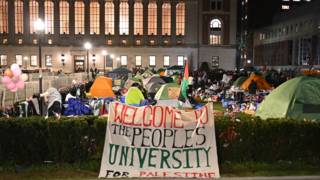
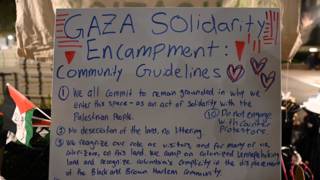
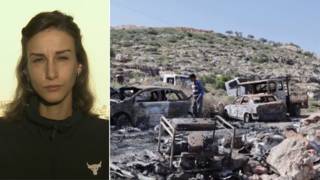
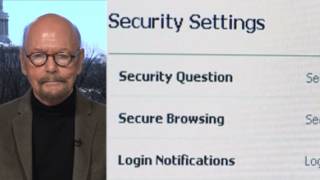





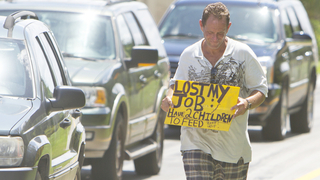
Media Options